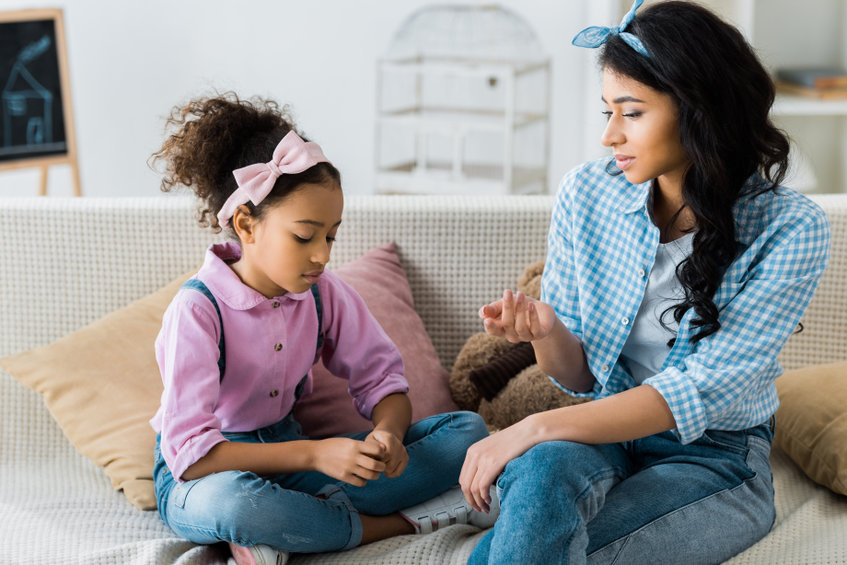5 Ways For Parents To Tell Their Kids That It’s Okay To Not Be Okay
Posted October 12, 2021 by Guest Poster -

It’s okay to not be okay…
October is Breast Cancer Awareness Month.
For many of us, kids especially, we associate breast cancer awareness with pink ribbons, community 5k walks and runs, and a powerful sea of women, moms, and families proudly standing up and advocating for visibility for this disease.
While this positive vision of supporting breast cancer is valuable, it is simply not the entire truth of a family’s experience with cancer.
Here are 5 ways for parents to tell their kids that it’s okay to not be okay
1. Plan on it
As awkward, painful, or complicated as it may seem, carving out a specific time to talk to your child about a new diagnosis or how you are feeling is essential. As parents, we want to “protect” our children from as much harm and pain as possible, but avoiding a topic or bringing it up “casually” leaves room for a child’s misunderstanding or a feeling that illness is an “off-limits” topic. Schedule some time after breakfast to walk the dog and talk, or over dessert after dinner to have a serious and open conversation.

2. Be Truthful
It seems obvious to tell the truth, but this can actually be challenging for parents when the future of a diagnosis is unknown, scary, or dangerous. It is not necessary to go into gory details, but it is important to take into account your child’s developmental level and tell the truth about the diagnosis in understandable terms. Tell the truth about why mom is going to the doctor so often, or how she might start to lose her hair, or that she might not be able to play on the playground as often. Be straightforward about what your family’s new reality might look like for a while. Be sure to leave space for questions, and make talking about illness a normal conversation topic.
3. Model
Our children are always watching our every move, whether we realize it or not. So, when talking about a difficult diagnosis or a new illness, be mindful of how you, your partner, or the rest of the family talk about it. It’s okay to talk about your fears openly, or ask for help when you are having a particularly difficult day. A study found that daughters of mothers with breast cancer felt fear about their own bodies, especially during puberty. However, open conversations about these fears with their mothers helped to ease their anxieties. Modeling these conventions are important so we can signal to our children that it is okay to not be okay, and that as a family, we can be open with each other about our feelings and needs.

4. Support System
Building and sharing our support system with our children is another important part of navigating a new diagnosis. A study on children with mothers diagnosed with breast cancer found that while daughters in particular had a greater risk of depression, this risk was mediated by a strong support system surrounding the family. Make sure your children are aware that they can ask dad, the neighbor, or their best friend’s mom for help if mom is unavailable.
5. Listen to your child
Make space and time to really listen to our children’s own fears and anxieties surrounding a health scare or a new diagnosis. Tell them it’s normal and expected to feel some level of worry, and let them know that you are here to help them navigate these new feelings. Be aware that a life-threatening diagnosis of a parent can be a risk factor for depression, anxiety, and trauma in a child, and reach out to mental health professionals if your child needs additional support. At
It’s okay to not be okay.
Journal of Pediatric Psychiatry
Adjustment of Children and Their Mothers with Breast Cancer
National Library of Medicine
When mothers get cancer: psychological effects on children and needs for prevention
Harvard Health Blog
How to Talk to Children About the Serious Illness of a Loved One
This post was written by a Charlie Health employee and mental health professional as part of a partnership with PrairieWifeInHeels.com that lasted from August 2021 – May 2022
Categories: Health and Wellness, Parenting, This and That
Tags: , cancer, charlie health, chronic illness, mental health, support, talking to kids about illness, telling your kids about cancer
Previous Post « Behind The Blog: You Need To Get Paid For What You’re Doing
Next Post Starting Over…Again. »





